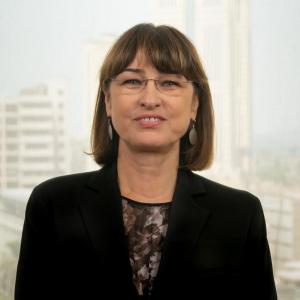KEYNOTE SPEECH MS. ELENA PANOVA UN RESIDENT COORDINATOR IN EGYPT AT THE OPENING SESSION OF THE FIFTH EDITION OF THE ARAB SUSTAINABLE DEVELOPMENT WEEK
GENERAL SECRETARIAT OF THE LEAGUE ARAB STATES
CAIRO, 23 November 2024
Excellencies, partners, esteemed colleagues.
My thanks to His Excellency, Mr. Ahmed Aboul Gheit, the Secretary-General of the League of Arab States, for the invitation to address the 5th Sustainable Development Week.
This year's theme, “Sustainable Solutions for the Future,” highlights the urgent need for transformative approaches to address the inter-linked and unprecedented challenges we face: the escalating climate crisis, growing geopolitical instability, and widening inequalities.
As the UN, we champion collective action, recognizing that our shared challenges demand shared responsibility, and that working together leads to better and more innovative solutions.
This gathering is a demonstration of multilateralism in practice.
I appreciate the close partnership between the League of Arab States and the UN system, which is supporting SDG progress across the region in key areas:
- Protecting vulnerable populations, including refugees and migrants.
- Combating threats like drugs, crime, and corruption.
- Addressing climate change, food security, and water scarcity.
- Promoting regional security, including partnerships for both the youth and women’s peace and security agendas.
Excellencies, dear colleagues.
In 2015, the world rallied around the 2030 Agenda, igniting hope for a better future.
But with less than six years remaining until the 2030 deadline, just 17% of SDG targets are on track.
This demands urgent action to deliver on our promise to “leave no one behind”.
In September in New York, the UN hosted the Summit of the Future. The Summit produced the inter-governmental 'Pact for the Future,' a landmark agreement that renewed global commitments to multilateralism, sustainable development, equity, and peace.
I commend the League of Arab States for its role in shaping and endorsing this pact, which aligns with the League's own vision for a more prosperous, resilient, and stable region.
I will highlight today three aspects of the Pact particularly relevant to our discussions this week.
First: Financing
The Pact for the Future aims to forge a global financial system that is just and equitable.
It includes commitments to improve access to affordable finance; manage debt; and amplify the voice of developing nations in global institutions.
The next milestone on advancing FFD will be the 4th Conference on Financing for Development, which UN will convene next summer in Seville, Spain.
For us, at the UN, the focus on FFD in Egypt started here, at the Arab League. In 2022, at the 4th Sustainable Development Week we saw the launch of the League’s report: Financing Sustainable Development in Egypt, a review of constraints to financing Egypt’s SDG ambitions together with recommendations for action.
As a follow up, the UN system is proud to have partnered with the Government of Egypt, led by the Ministry of Planning, Economic Development and International Cooperation, to develop an Integrated National Financing Strategy—a key recommendation from the League’s report and a roadmap for mobilizing and effectively allocating finance for the SDGs.
This provides Egypt a strong foundation for engagement on sustainable financing next summer in Spain.
The FFD conference in Spain will be an opportunity for making further progress towards an equitable international financial architecture fit for addressing urgent global issues, including climate change.
Let me quote the UN SG here, who in his remarks at the closing of COP29 early this morning stated:
“We need swift action to deliver on commitments made in the Pact for the Future. Particularly on effective action on debt; increasing concessional finance and improving access; and substantially increasing the lending capacity of the Multilateral Development Banks, with adequate recapitalization.”
Building on the results of COP29 and making available affordable and predictable climate finance is essential for this region to adapt, build resilience, and enable a just and equitable transition.
Second: Social development.
According to the World Bank, the Middle East and North Africa is the only region that has seen a reversal in poverty eradication over the last decade.
Young people constitute about 60% of the region’s population.
Youth unemployment is 24% -- the highest of any region and nearly double the global rate.
The Pact urges nations to prioritize investments in poverty eradication, human capital development, and social inclusion.
It also includes commitments to invest in young people and integrate them into decision-making processes.
2025 will see the "Second World Summit for Social Development" in Doha, Qatar.
The first Social Summit in 30 years this will be a critical moment for galvanizing action and securing global and regional partnerships to reduce poverty, inequality, and exclusion.
Third: Technology.
In the words of the UN Secretary-General: “technology can ‘turbocharge’ achievement of the SDGs”.
The UN estimates that digital technologies can help reach 70% of the SDG targets.
The Arab region is embracing the digital age, with rising internet access and adoption of digital technologies.
But a digital divide persists, particularly for women, rural communities, and marginalized groups.
The Pact for the Future includes a Global Digital Compact, a roadmap for harnessing technology's potential and ensuring it benefits everyone.
This is a game-changer. It gives for the first time a framework for responsible and human-centered digital development, emphasizing ethical AI, universal connectivity, and reliable digital infrastructure.
Excellencies, dear colleagues.
We face significant challenges.
It is only through cooperation that we can deliver sustainable solutions.
Quoting again the UN Secretary-General at the Summit of the Future: through the Pact for the Future the international community has “unlocked the door”.
“Now it is our common responsibility to walk through it.”
This demands global, regional and national collective action, rooted in solidarity, equity, and the meaningful participation of all.
The UN System stands ready to work with the League of Arab States, and with the range of development partners, to unleash the region’s potential, meet the aspirations of its youth, and build a better future.
Thank you.


















